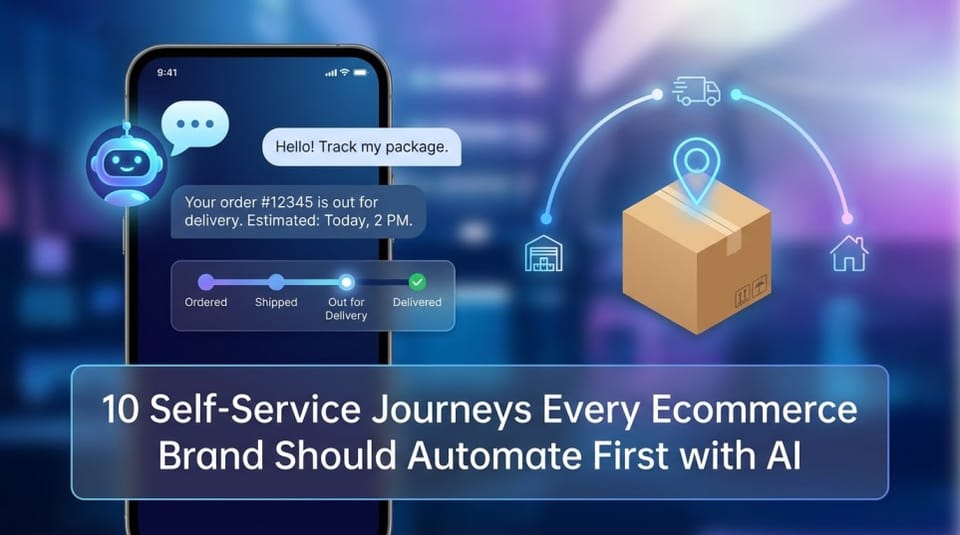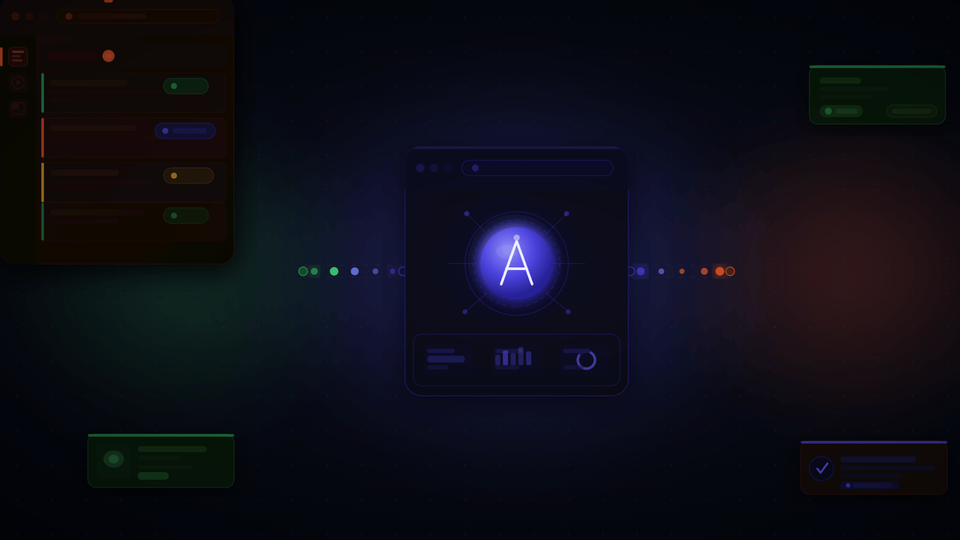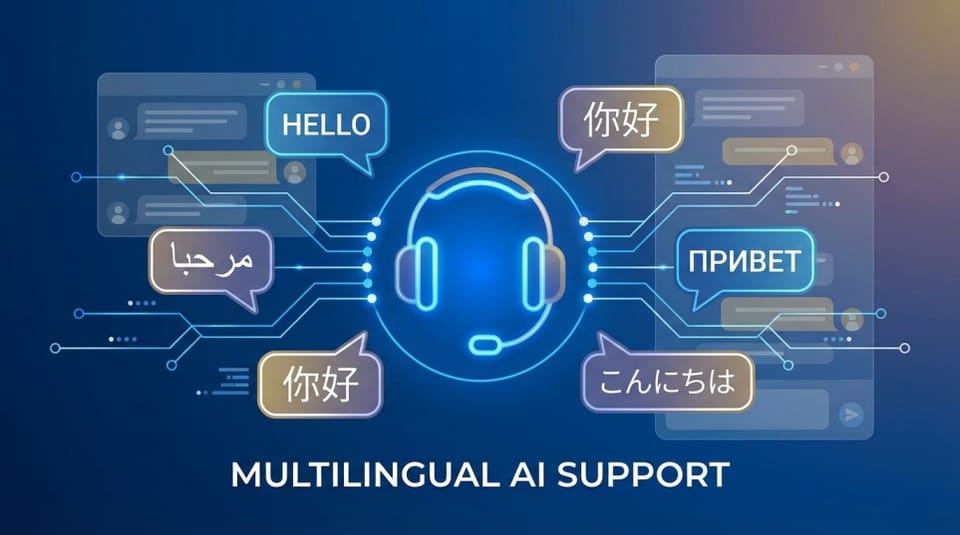Is Your Business Ready for AI Customer Service? 7 Key Signs
Discover the 7 signs your business is ready for AI customer service and how Alhena AI boosts speed, accuracy, and customer satisfaction.

AI is rapidly reshaping customer service across e-commerce, SaaS, retail, and beyond. Nearly 69% of customer support professionals are already using some form of AI or conversational AI to streamline service operations, automate routine tasks, and improve customer satisfaction. Industry leaders like Amazon have invested heavily; Amazon’s recently redesigned, generative AI-powered customer service chatbot boosted satisfaction by 5%.
With customer expectations soaring and real-time interactions becoming the norm, how can you tell if your business is ready to ride this AI-powered wave?
Below, we outline seven key signs, from operational bottlenecks to customer sentiment and financial pressures, that indicate it’s time to elevate your customer experience with platforms like Alhena AI. If several of these sound familiar, your organization may be primed to implement AI customer service and benefit from automation, personalization, and scale.
1. Your Team Is Swamped with Repetitive Customer Queries (Operational Pain)
One telltale sign is When your support team spends most of its time answering the same customer inquiries “Where’s my order?”, “How do I reset my password?”instead of tackling complex issues, you’re burning valuable human agent capacity on low-value tasks. These repetitive interactions lead to burnout, inconsistent responses, and slower service.
AI Advantage:
Modern AI chatbots and virtual agents powered by natural language processing (NLP) can automate these repetitive workflows instantly. Alhena AI uses conversational AI to understand intent, analyze queries, and pull accurate answers from your knowledge base in real time. It handles high-volume conversations before a human agent needs to step in.
Why This Signals Readiness:
Repetition is where AI is strongest. If your queue feels like a copy-paste factory, it’s a clear sign you’re ready to use AI to streamline processes, reduce wait time, and enhance both self-service and human-agent productivity. In short, a queue full of déjà vu questions is a flashing sign that AI customer service could dramatically improve your efficiency.
2. Support Volume Is Outpacing Your Capacity to Scale
Another sign is when your customer support demand grows faster than your team - and faster than hiring or training can keep up. Perhaps your ticket volume is climbing 20%+ year over year due to business growth or seasonal spikes. You might notice SLA targets slipping and customer satisfaction dropping as a result. Maybe you’ve hit a wall where adding headcount for support is too costly or slow, yet your existing team can’t cover 24/7 inquiries or surging volumes.
From an operational perspective, this is unsustainable. Many retailers face this when expanding to new markets. The pain is clear: growth is straining your service capacity, risking longer wait times and frustrated customers.
AI’s Advantage:
AI customer service platforms can scale instantly and globally without proportional costs. Alhena AI can handle hundreds of chats simultaneously, something no human team can do. AI tools scale your service operations instantly. With machine learning and predictive analytics, Alhena AI helps forecast volume spikes, triage complex interactions, and automate routine workflows. It delivers consistent response time even during unpredictable surges.
Why This Signals Readiness:
If “too many tickets, not enough people” is a familiar issue, AI augmentation is table stakes. Real-time automation lets you grow without ballooning headcount—especially important for global customers who expect 24/7 support.
3. Customers Expect Instant, 24/7 Support, and Your Service Can’t Deliver
From the customer’s perspective, a major red flag is increasing frustration with slow or limited-hour support. Today’s shoppers expect immediate, AI-powered customer service across channels. Long hold times, slow email replies, and poor after-hours coverage are now deal-breakers, directly impacting customer experience and loyalty.. A Salesforce study found 83% of service leaders believe customers now expect quicker, more personalized support than ever. Rising complaints about long hold times or slow email replies, high bounce rates on your support chat outside business hours, or low CSAT scores related to response speed are clear signs.
AI’s Advantage:
Alhena AI provides instant, 24/7 responses with generative AI, dramatically reducing wait time. It understands customer needs, analyzes sentiment within each interaction, and escalates to humans when issues are complex.
Why This Signals Readiness:
If speed is a recurring complaint in reviews, dashboards, or NPS feedback, AI becomes essential. Customers want fast, personalized service, even at midnight. Artificial intelligence lets you deliver that baseline consistently.
4. Customer Service Costs Are Climbing and Efficiency Is a Priority
From a financial perspective, look at your customer service budget and KPIs. Is your cost per ticket rising? Are support salaries, training, and overheads eating a larger chunk of revenue each quarter? Many companies hit a point where scaling support with humans yields diminishing returns; costs go up faster than customer volume or revenue.
You may already see:
- Rising cost per ticket
- A growing share of revenue going into support and outsourcing
- Pressure from finance to “do more with less”
But cutting service hours, channels, or quality isn’t an option if you care about retention and brand.
AI’s Advantage:
AI-powered automation lowers your cost-per-contact dramatically. With Alhena AI, you can:
- Automate high-volume, low-complexity interactions
- Use agent-assist tools to boost human agent productivity
- Reduce repeat queries through accurate, streamlined responses
- Personalize answers at scale
AI becomes “an army of agents for the price of one,” improving both cost efficiency and customer satisfaction.
Why This Signals Readiness:
If cost is under scrutiny but service quality cannot drop, AI is the only lever that improves both simultaneously. It shifts your support team toward higher-value work while automation handles the rest.
5. Service Quality Is Inconsistent (Knowledge Gaps, Training Burdens or Multilingual Needs)
As your business expands, new products, new regions, new languages, service consistency becomes harder to maintain. Knowledge gaps, long onboarding cycles, and uneven multilingual support create unpredictable outcomes.
As your catalog, policies, and geographies expand, consistency gets harder:
- Different agents give slightly different answers
- New hires take months to ramp
- Knowledge lives in people’s heads or scattered docs
- Supporting customers in multiple languages is costly and patchy
AI-powered support can instantly overcome language barriers by translating customer queries and responses on the fly.
AI’s Advantage:
Conversational AI ensures consistent, policy-aligned, multilingual support. Alhena AI:
- Pulls answers from a unified knowledge base
- Tailors responses using personalization and sentiment analysis
- Supports multiple languages with real-time translation
- Maintains tone, accuracy, and brand voice
AI chatbots using NLP keep interactions reliable, even as complexity increases.
Why This Signals Readiness:
If you already maintain documentation or localized content but still struggle with consistency, AI can standardize service effortlessly. It ensures every customer receives the same accurate, branded experience, no matter the language or channel.
6. Your Competitors (and Industry Leaders) Are Embracing AI, Raising the Bar for Service
From the retailer/business perspective, if peers and rivals are leveraging AI in customer interactions, you risk falling behind by standing still. Even giants like Amazon set customer expectations that ripple across industries. As noted, Amazon’s AI investments (from the Rufus shopping assistant to AI chatbots) are raising the bar for convenience.
AI’s Advantage:
Adopting AI in customer service enables faster, better, and cheaper service, which often translates to higher customer satisfaction and loyalty. Adopting AI isn’t just defense; it’s offense.
AI tools allow you to leapfrog competitors. Alhena AI enables:
- Always-on, context-aware support
- Agentic workflows that complete tasks (refunds, replacements, product suggestions)
- Predictive assistance and proactive outreach
- Voice and chat automation that unify channels
AI-powered customer service becomes a revenue driver, not just a cost reducer.
Why This Signals Readiness:
If your peers are already moving, the question is not whether AI belongs in your roadmap, it’s how quickly you can adopt it responsibly. The longer the gap, the more noticeable the difference in customer experience, especially for digital-native buyers.
7. You Have the Right Foundations (Data, Systems, and Culture) for AI Adoption
Implementing AI in customer service isn’t just a plug-and-play affair; it works best when you have certain foundations in place. A business with an existing omni-channel support setup (email, chat, social) is perfect for inserting an AI to help manage those channels. If your customer service folks are already asking for better tools or aren’t afraid of automation, that cultural readiness will smooth adoption.
AI’s Advantage:
When foundations are in place, an implementation like Alhena AI can:
- Plug into your existing systems via APIs and connectors
- Use your orders, catalog, policies, and historical tickets to ground responses
- Provide clear reporting on deflection, CSAT impact, and agent productivity
- Fit into your change-management process rather than fight it
You get quick wins first, like deflecting order-status questions or handling returns, and expand into more complex use cases over time.
Why This Signals Readiness:
Being “data-rich but insight-poor” is one of the clearest signals you’re ready for AI. Organizations that are “data-rich but insight-poor” unlock huge value once AI enters the workflow. If you’ve invested in tools, processes, or customer-centric culture, AI is the natural next layer that turns your data into intelligent action.
Conclusion
In today’s customer-centric era, recognizing these readiness signs early is key. If your team feels stretched, customer expectations are rising, costs are climbing, or competitors are accelerating with AI, you’re not falling behind, you’re ready. Seeing yourself in several of these scenarios is not a problem, it’s a roadmap.
From handling high-volume inquiries to powering intelligent self-service and AI-powered customer support, Alhena AI streamlines operations, improves satisfaction, and transforms every workflow that touches your customer.
Ready to See Where AI Fits in Your CX Strategy? Schedule a demo with Alhena AI and discover how AI customer service can shift from buzzword to measurable, revenue-driving impact for your customers, your support team, and your bottom line.
FAQs
What is AI customer service?
AI customer service uses artificial intelligence, chatbots, and generative AI to automate customer inquiries and improve the overall customer experience. Alhena AI provides an AI-powered system that resolves queries in real time using your knowledge base, policies, and customer data.
How does AI improve customer satisfaction?
AI improves customer satisfaction by delivering instant responses, consistent answers, and personalized interactions based on customer needs. Alhena AI enhances satisfaction by using generative AI to personalize support and reduce wait times across channels.
Does Alhena AI provide multilingual support?
Yes. AI uses conversational AI, NLP, and translation models to deliver multilingual support instantly. Alhena AI enables global coverage without extra staffing.
When should a business adopt AI customer service?
You’re ready if you face repetitive inquiries, long response times, rising support costs, or multilingual needs, or if your support team struggles to scale. AI helps streamline operations and enhance customer satisfaction.
Can Alhena AI integrate with my existing helpdesk?
Yes. Modern AI tools, like Alhena AI, integrate with Zendesk, Freshdesk, Salesforce, Gorgias, Intercom, Shopify, WooCommerce, and more.


